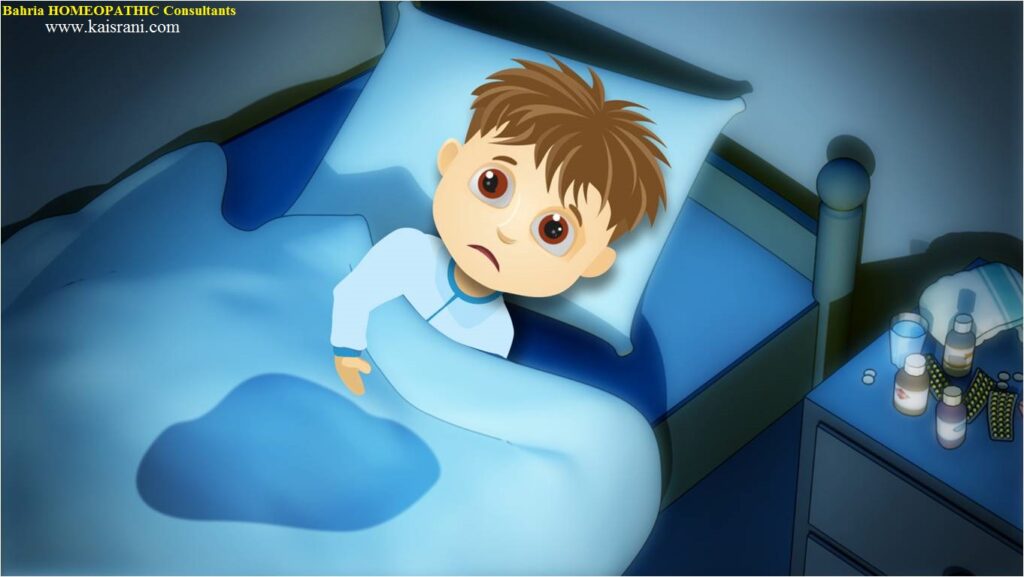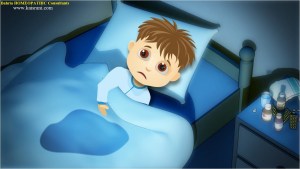 Enuresis or Bed-wetting / Bed wetting بچوں کا بستر پر پیشاب کر دینا refers to the involuntary passage of urine during sleep. Nocturnal enuresis of children may be simply a delay in the establishment of voluntary control over the act of micturition.
Enuresis or Bed-wetting / Bed wetting بچوں کا بستر پر پیشاب کر دینا refers to the involuntary passage of urine during sleep. Nocturnal enuresis of children may be simply a delay in the establishment of voluntary control over the act of micturition.
Although bed wetting is quite normal in infants and children in the first one year, about 5% of 10 year olds and 13% of 6 year olds wet the bed. Most girls can stay dry by age of 6 and most boys stay dry by age 7 years. Any child having reached the age of eight years and not having gained full nocturnal control must be subjected to complete investigations. The child itself only is not responsible as generally considered by the parents since it is beyond his control and if the case is taken up properly and all aetiological factors are taken into consideration the child can be cured. Homeopathic treatment is very successful in curing bed wetting in the children.
Types – There are 2 types of enuresis.
- Primary, in which the child has never been dry at night.
- Secondary, in which the child is dry for a period of months or years and then begins to wet the bed.
Primary Enuresis / Bed-wetting: Primary enuresis has an organic basis and common causes are
- Delay in maturation of the relevant part of the nervous system.
- Some children acquire control the bladder late.
Organic causes:
In Boys:
- Defect in urethral valve.
- Adherent / elongated prepuce
- Phimosis
In Girls:
- Ectopic ureters, which may open in urethral part of vagina. Suspected when the child is able to pass urine normally but dribbles day and night.
- Hooded clitoris.
- Psychological cause:
- Over enthusiasm on the part of parents regarding the child’s toilet training leads to undue anxiety and enuresis.
- Yelling or spanking the child about his ill-performance or ridiculing him especially in the presence of others has a negative effect on his toilet training.
Secondary Enuresis / BedWetting — Common causes are:
- Psychological causes:
- Worry at home or school has reflex irritation of the bladder resulting in enuresis.
- A move to school to school.
- A move to house to house
- Epilepsy
- Chorea is an exciting cause
- Composition of urine:
- High acidity of urine
- Presence of uric acid crystals.
- Skin diseases:
- Erythema
- Eczema
- Pruritis
- Diet:
- Liberal indulgence in saccharine food
- Liberal use of articles rich in sugar
- Liberal use of a fatty articles
- Liberal use of fruit rich in sugar
- Drinking of too much coffee
- Worms
- Traumatic:
- After circumcision operation
- Catheterization
Symptoms: These are usually self apparent; some children will sleep right through the night and still wet the bed while asleep while others will wake up and then wet the bed. There may be symptoms of itching in genitals or anus in some children.
Diagnosis: A detailed history along with thorough examination is essential to diagnose the case. All extrinsic causes having been excluded, a full urological investigation will be preferred including:
- Sex: Clinical examination of the external genitals of to rule out any organic defect.
- Urine: Chemical and bacteriological examination of twenty four hours specimen of urine to determine any change in composition of urine or any sediment exerted in the urine
- Stool: Examination for worms, some times repeated tests are required as worms are not detected in first and second stool specimen examination.
- Congenital Malformation: Attention should be paid to find any congenital malformation, folds or flaps of mucus membranes in the urethra, narrowing of the bladder neck etc,
- Psychological Investigation: In whom the most searching investigations fail to reveal any abnormality, they will usually be of a highly nervous disposition; here a homeopath will play a role of physician, diagnostician and psychologist as well.
Coping with Bed wetting
Factors that affect the age at which wetting is considered a problem include the following:
- The child’s sex
- The child’s development and maturity
- The child’s overall physical and emotional health
- The culture and attitudes of the child, parents, and caregivers
Bed wetting / Enuresis usually goes away on its own. But until it does, it can be highly uncomfortable and embarrassing for your child. So it’s important to provide positive reinforcement and support during this process. If following measures are adopted properly along with removal of the cause (if any) can be very helpful in curing Bed-wetting.
- Diet: The child should not be given much liquid diet, much spicy or salty in the evening as they tend to increase urine out put. These things may be given during day time and not before retiring. The child should be given light diet especially at night.
- Sleep: Don’t let the child sleep on his/her back as it is an indication of some disease. The child should not be put to bed immediately after food.
- Punishment: Bed-wetting is a developmental delay, not an emotional problem or physical illness. The parents should be cautioned against punishing their children for the act of bed-wetting.
- To increase the sensibility of the bladder: To allay the sensibility of bladder the child should be encouraged to retain water as long as possible in day time. Parents should encourage the habit while going out of house such as picnic etc,
- Remind the child: to go to bathroom before he goes to sleep.
HOMEOPATHIC TREATMENT OF ENURESIS / Bed wetting / Bed-wetting / بچوں کا بستر پر پیشاب کر دینا
Due to Organic causes
Causticum: Particularly in children during first sleep worse in winter and ceases or becomes more moderate in summer with great debility.
Belladonna: Children with restless sleep, light hair, blue eyes, and fine complexion involuntary urination consequent upon paralysis of sphincter muscles.
Rhus Tox: Enuresis due to weakness of bladder with constant dribbling of urine.
Ferrum Met: As under change of composition of urine.
Sabal Serrulata: Constant desire to pass urine at night due to paralysis of sphincter.
Gelsemium: does not like to talk with any body due to paralysis of sphincter muscles.
Dulcamara: Bed wetting / Enuresis after some disease of bladder, worse from cold and damp. The child desires different things, but rejects on receiving them, copious turbid foul smelling urine.
Petroleum: Due to weakness of bladder, urine drops out even after urination, involuntary at night in bed.
Due to Psychological Causes
Kreosotum: Enuresis with dream of urination in a decent manner, wets the bed at night. A girl 16 years of age suffering from bedwetting has been cured on the basis of this particular symptom.
Borax: Frequent urination at night, children who are frightened when being laid in a cot or carried down stairs.
Argentum Nitricum: Great nervousness with restlessness, urine passes unconsciously and interruptedly, pale fetid urine, drinking coffee aggravates.
Sulphur: Wetting bed at night, copious discharge of children who suffer from chronic cutaneous eruption.
Psorinum: Worse during full moon. Intractable cases, when there is an eczematous history. In children when there are Psoric manifestations. Secretions have filthy smell. The child is very sensitive to cold.
Constitutional Basis:
Calcarea Carbonicum: complaints of children who are fat, fair and flabby too much emission of urination at night. Sour vomiting of children during dentition with a tendency to eat indigestible things such as chalk, pencils etc.
Medorrhinum: In children where there is a psychotic history nocturnal enuresis weak memory, fear in the dark as if some one is behind her/him.
Sepia: The sepia child is dull, depressed moody indolent with a greasy skin disinterested in work worse from change of weather. A tendency to diarrhoea from boiled mil, the child is prone to enuresis during the first sleep (Causticum).
Tuberculinum: Enuresis in a child with primary tuberculosis psychotic persons.
Sulphur: For pale lean children with loose abdomen who love highly seasoned food, sugar and aversion to be washed, micturition midnight.
In young girls
Pulsatilla: Suited to cases of nocturnal enuresis occurring in children of tearful habit, conscious of its leakage but unable to control it. The urine passed drop by drop.
Kali Phos: Enuresis in longer children due to nervous factors.
Calcarea Carb: Scrofulous children sweat easily wetting the follow and catch cold easily.
Kali Bromium: Nocturnal enuresis from profound sleep of children or young persons.
Lac Canium: As under psychological causes.
Opium: As under psychological causes
When without any apparent cause but due to more habit
Equisetum: Enuresis by day and night, it acts well when it remains a mere force of habit, after removal of the primary cause, dreams of seeing crowd of people
Due to Defective Digestion
Nux Vomica: Loves fats and tolerated them well, nausea in the morning after eating. Irritable bladder from spasmodic splinter, frequent calls little and often with dribbling of urine.
Carbo Veg: When associated with acidity of the stomach
Iodine: Children eat too much but still emaciate all the time.
Change in Urine Composition
Benzoic Acid: When enuresis is accompanied by high colored and strong smelling urine, Benzoic acid will turn the urine normal and prevent its escape.
Ferrum Met: More in day time than at night. Floods the bed 5 to 6 times at night; stains the bed very dark and smell very strong. Clay colored sediment adhering to bottom of vessel.
Cubeba: Urine foamy with smell of violets. Frequent urination due to some organic disease as urethritis prostates.
Viburnum: Urine of a foul odor like cat urine can not hold urine while walking.
When Due to Worms (Read This Article in Urdu Homeopathy for further information)
Cina: The chief remedy for worms. The child is very irritable useful for round and thread worms (not pin worms) urine turns milky on standing. Enuresis during first sleep, great appetite soon after leaving the table.
Silica: Useful for children suffering from worms due to weakness of urinary organs
Santon ine: Especially useful for children suffering from ascaris, lumbricoids and thread worms and not tape worms, urine greenish if acidic and reddish if alkaline
Sepia: Incontinence of urine at night especially First Sleep the urine is very offensive and deposits a clay colored, sediment which adheres to the chambers.
Natrum Mur: Hungry yet looses flesh, craving for salt , aversion to bread and fats, child emaciating from neck urine passing involuntarily when walking and coughing, has to weight a long time for it to pass if others are present.
“Kreosotum” and “Belladonna” – Who sleep so deeply that they loose control of their bodily function. “Sepia” wets himself during the first part of the sleep, while his days are spent tidying up in order to restore a sense of cleanliness and order. “Capsicum” has never recovered from a house move or other displacement.
Kali Bichromicum: is trying to define his boundaries just like an animal marking its territory
Lac Canium: is the main remedy for long standing enuresis, which may continue through in to adolescence. The patient believes he is worthless and that he will never achieve any thing.
Parents must remember that bed wetting is NOT the child’s fault. Instead, they should be treated with utmost consideration and understanding. Homeopathic Treatment can be successfully achieved with the help and support of the child’s parents and family. Homeopathy is safe for children but it is still highly advised though, to seek help from a homeopath before giving the child any bedwetting homeopathic treatment.
References:
- Bedwetting and Homeopathy (Dr. B.S. Suvarna)
- Constitutional Homeopathic Treatment of Bed wetting Issue in Children (Hussain Kaisrani, Bahria Homeopathic Consultants)
- Homeopathic Provides Best Solution of Bed-wetting
- بستر میں پیشاب کا ہومیوپیتھک علاج (حسین قیصرانی)۔
- A New Model for Health and Disease (Dr. George Vithoulaks)
- BEDSIDE Clinical Tips in Homeopathy (Farokh J. Master)
 Homeopathy Treatment and Medicines for Bed Wetting / Enuresis / بچوں کا بستر پر پیشاب کر دینا"
class="img-fluid"
style="max-width: 100% !important; height: auto !important;">
Homeopathy Treatment and Medicines for Bed Wetting / Enuresis / بچوں کا بستر پر پیشاب کر دینا"
class="img-fluid"
style="max-width: 100% !important; height: auto !important;">
